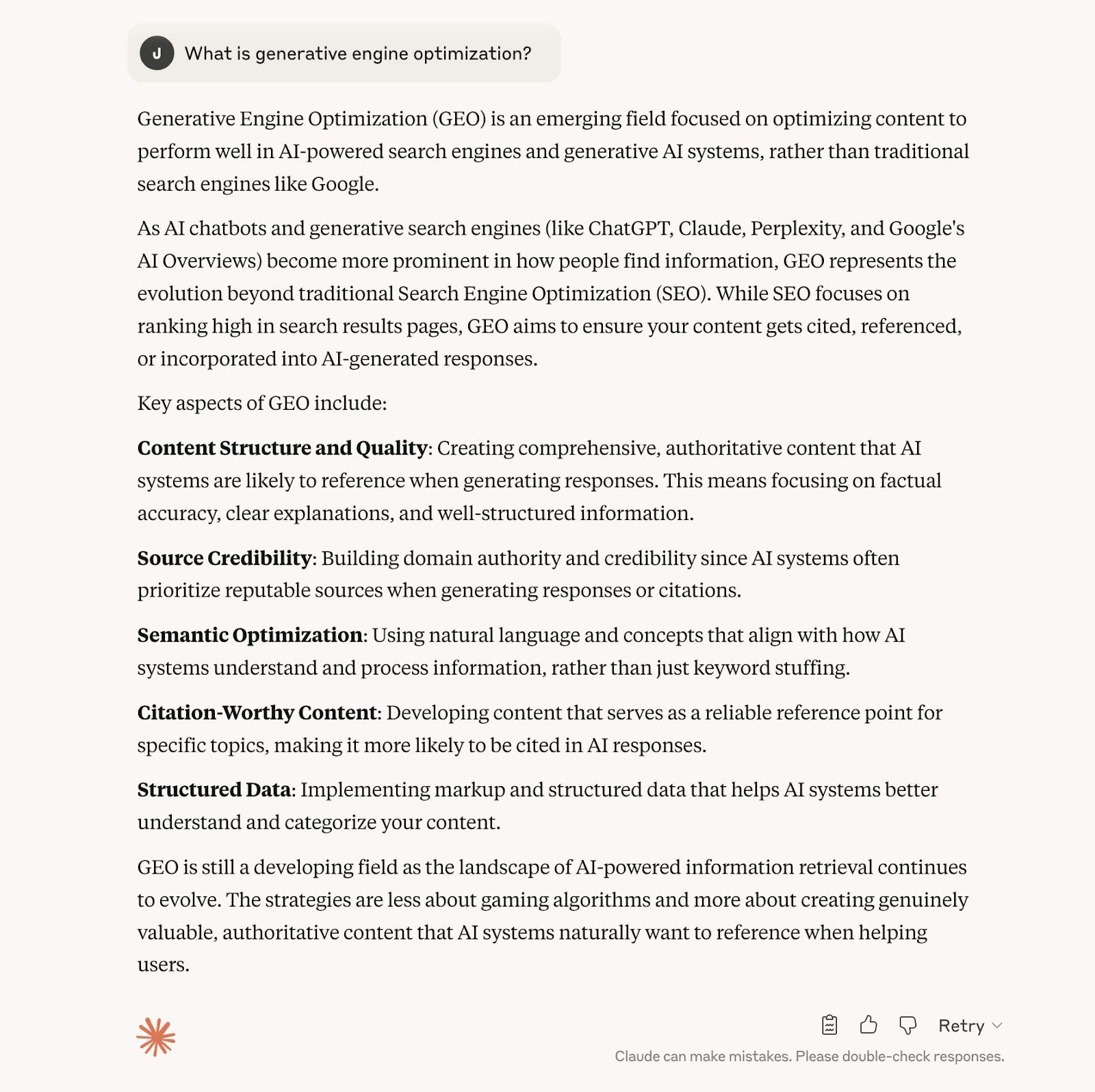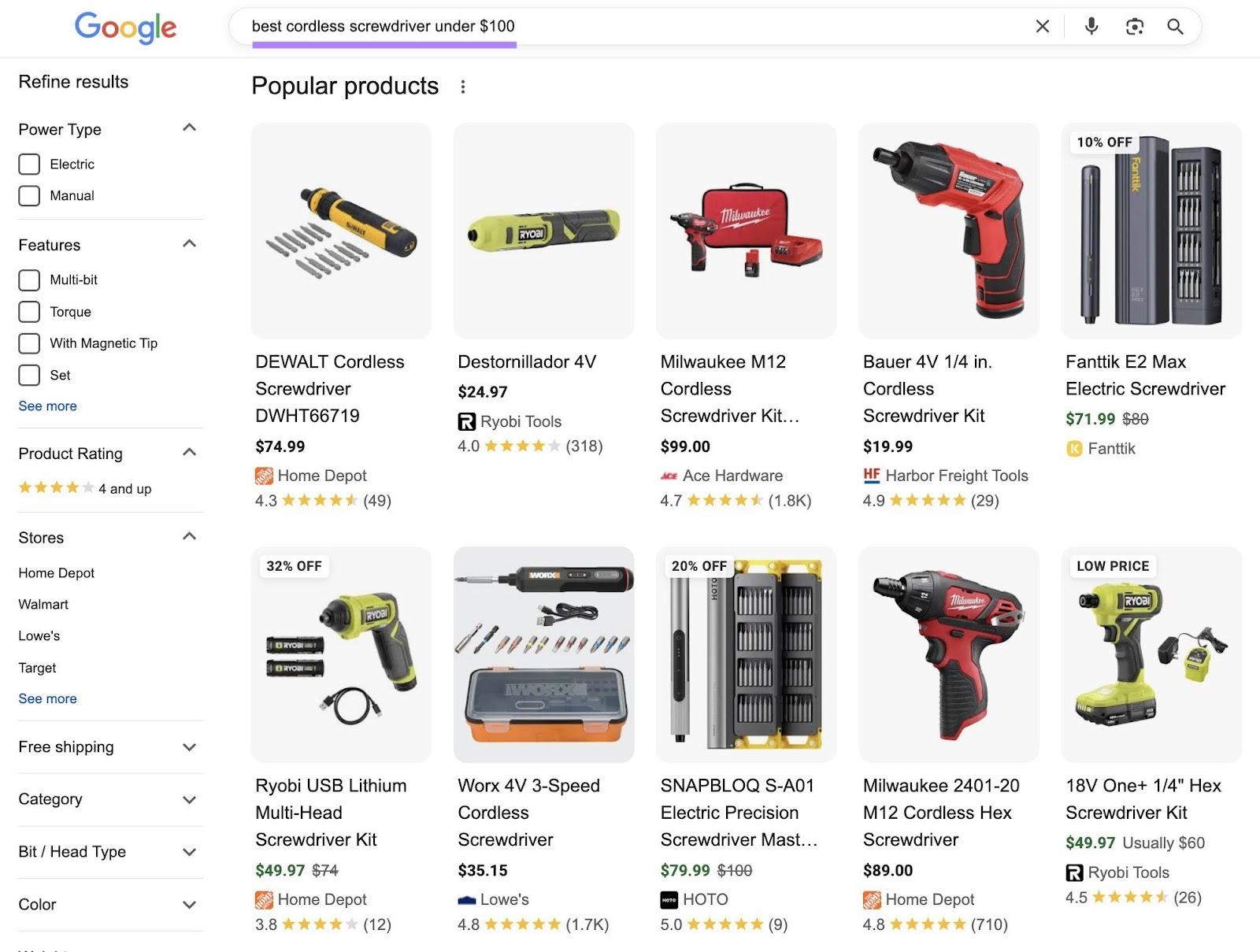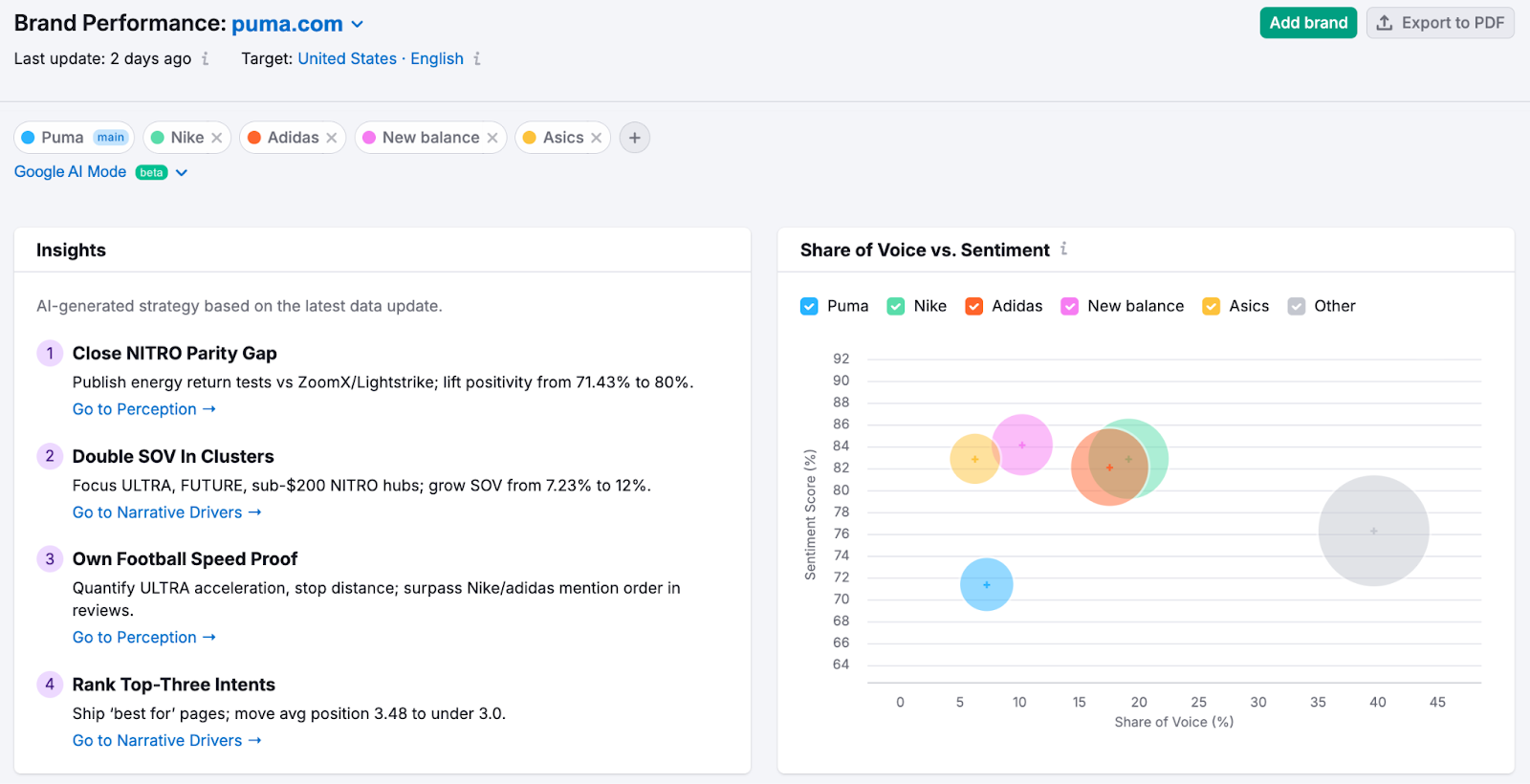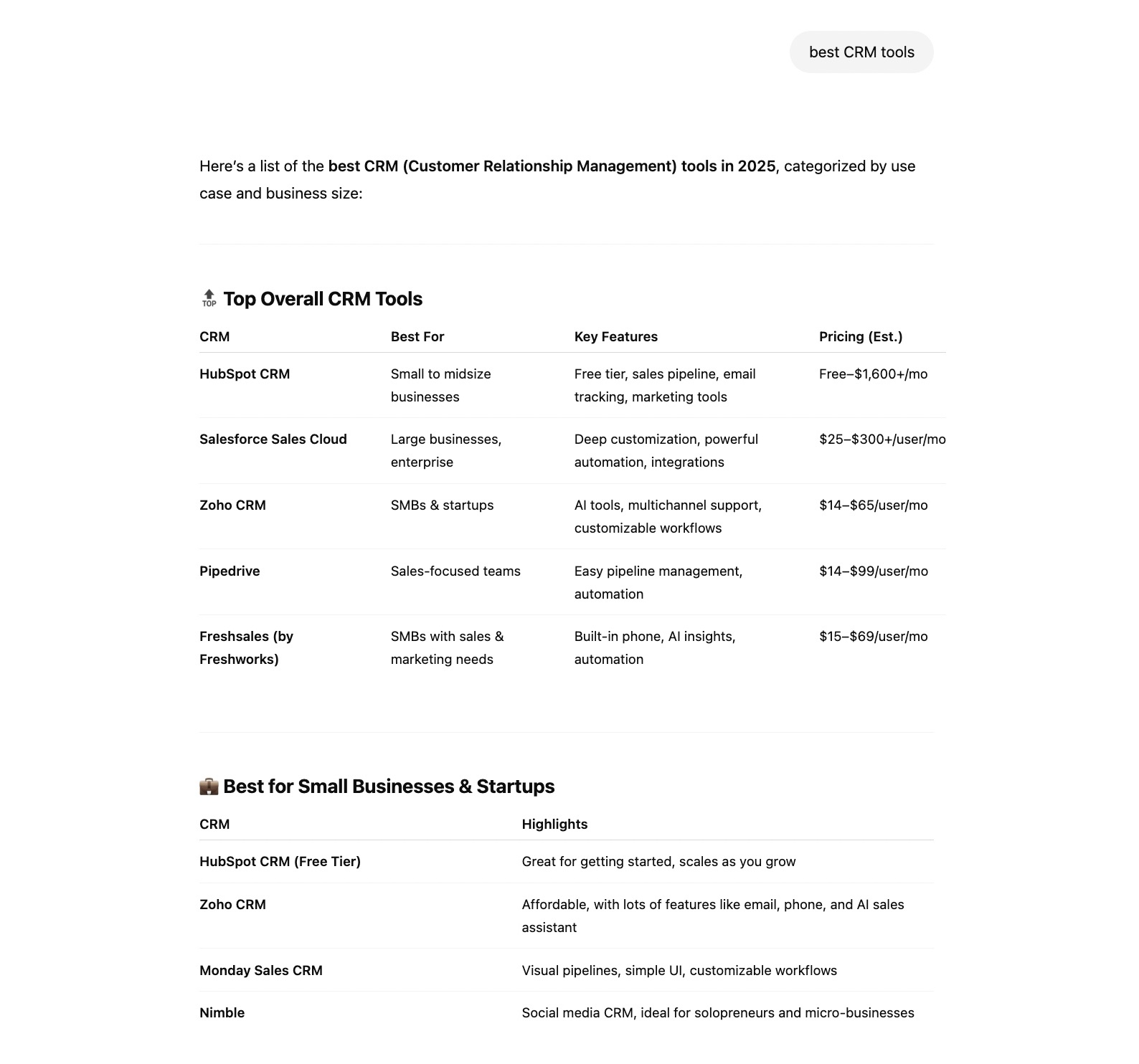Search is changing. Fast.
Search engine optimization (SEO) helps your content in Google’s search results.
Generative Motor Optimization (GEO) helps your content appear and is quoted in AI response from tools such as Chatgpt, Perplexity and Google AI listings.
At the end of this guide you understand Geo vs. SEO, where they overlap and differ and how to optimize for both.
Plus, you get this clear GEO optimization list you can apply right away.
What is search engine optimization?
SEO is the process of improving your site to help it show higher in search results and drive more organic (unpaid) traffic.
SEO techniques include:
- Keyword study
- Internal Linking
- On-page optimization
- Schedule marking
- Building Backlinks (ie to get other sites to link to you)
What is generative engine optimization?
GEO is the process of improving your site to increase the chance of AI-generated answers in LLMS such as Google AI listings and chatgpt publicity and/or links to you.

To optimize to GEO:
- Use factually, brief language
- Structure content so that LLMS can easily analyze and summarize it
- Publish authoritative content that other trusted sources mention
- Add Schedule -Marking and Use Formatting, As AI Systems Can Read (eg Avoid JavaScript for Key Information)
Additional reading: Large Language Model (LLM) Optimization
Why does Geo mean something?
Traditional SEO gets your content or offer listed. Geo gets your content or offer Recommended.
If a user searches on Google for “Best Wireless Screws Under $ 100”, they see a list of products they can buy. And SEO helps your product appear on this list.

If a user asks a generative AI tool the same thing, it gives a recommendation – not just a list of settings. And GEO helps your product become one of these recommendations.

In the above example, Chatgpt Milwaukee recommends M12 for professional work and Dewalt 8 V max for easy home use.
Plus, Google is rolling AI response to more and more queries.
According to Semrush’s survey of 10 million+ keywords, 13.14% of all queries triggered AI listings from March 2025. It has increased from 6.49% in January 2025 – Doubling in just three months.

If your content is not included in the AI response, it is less likely that seekers see it.
SEO vs. Geo: Similarities
SEO and GEO overlap in the well -structured, high quality authoritative content is rewarded.
Here, SEO and GEO overlook more specifically:
- Quality standards are crucial: Both Google and LLMS aim to earn high quality content that meets user needs and preferences
- It is more likely that structured content will be cited: Use headings, ball points, frequently asked questions and clear formatting to help Google and AI Parse Your Content
- Current authority contributes to visibility: Publishing clusters of related high quality content can help you
- Original research is valuable: Unique data attracts backlinks for SEO and improves citation probability for GEO
- Clear answers is best: Direct, concise answers work well in highlighted excerpts and AI -resume
If you are already producing strong SEO content, you’re halfway to Geo. To take full advantage of generative engines, you need additional optimization steps (we go over them later in this article).
SEO vs. Geo: Differences
SEO and GEO differ mainly in how the content appears and how success is measured. Let’s break down the differences:
|
Category |
SEO |
Geo |
|
Search production |
Serp with ranked links |
AI-Generated Text Answer |
|
Search engine type |
Traditional (Google, Bing) |
Generative (chatgpt, confusion, gemini) |
|
Inquiry format |
Short, key word -based |
Longer, more conversation perceptions |
|
Optimization target |
Higher rank in search results |
Inclusion or quote in AI-Generated Responses |
|
Content delivery |
User clicks through to your page |
AI summarizes or paraphrases your content inside its response |
|
Success measurements |
Click, Traffic, Location, Rate Rate |
Quotes, mentions and share of voice |
|
Content update needs |
Evergreen content can remain ranked for years |
Content must remain fresh and authoritatively to remain quoted |
What does it mean in practice?
Unlike SEO, GEO does not often operate direct traffic through locations. In fact, a study by Bain & Company shows that 80% of users answer 40% of their queries without clicking on a link.
So what is the goal of geo?
GEO positions your brand as a trusted source that AI assistants use in their answers. This presence builds brand awareness and can later operate branded searches and conversions.
Geo vs. SEO: Input signals, ranking logic and measurement
Input signals: Keywords vs. prompt
SEO starts with keywords: phrases that people enter in search beams.
Geo starts with prompt: Natural language questions users ask AI tools like chatgpt and confusion.
SEO -Success is partly hanging on using keywords in:
- Headings
- Title brands
- Meta descriptions
- Body text
In GEO, key word placement is less important.
AI models prefer content that reads as a Complete, reliable answer to a specific question. To optimize to the prompt:
- Write clear, direct answer to probable questions
- Add often asked questions With short, actual answers
- Use subheadings It matches how a user would put a prompt (for example, “what is geo?”)
Ranking: Serps vs. Generative answers
SEO content is built to rank in search results. GEO content is built to provide a direct answer.
Traditional search engines like Google Rank pages using complex algorithms that evaluate factors such as:
- Your content relevance to a sought -after keyword
- How many backlinks your site has and how reputable these links are
- How authoritatively your domain is
- How fast and user -friendly your site is
- The quality of your content
These factors determine where a page appears on SERP.
LLMs generate synthesized answers in real time. The model chooses, summarizes and cites sometimes entrusted sources.
Factors such as quality and relevance are still important in GEO. But for admission to AI-Generated Answers, your content must also be:
- Mentioned on the web
- Precise and context -dependent, which means excerpts from your content make sense even when quoted without thorough explanation
- Regularly updated (updates are important for SEO but LLMS seems to prioritize Recency even more)
KPIS & Measurement: Traditional measurements vs. AI Visibility Metrics
SEO is measured with traditional measurements that marketers have used for years. Geo is measured with new measurements relevant to AI.
Traditional SEO uses these key prestigants indicators (KPIs):
- Organic traffic
- Keyword rankings
- Click Frequency (CTR)
- Bounce Rate
- Conversions from search
Geo Success looks different as users rarely click on the links. Key GEO measurements include:
- Citation frequency in AI tools
- Fire or product mentions in AI -Svar
- Part of the voice in AI tools
You can measure your performance in LLMS using Semrush’s AI SEO Toolkit.

GEO optimization list
Use this checklist to optimize your content for generative engines such as Chatgpt, Perplexity and Google AI Overview:
Content quality
When writing site content, make sure it:
- Answer one or more specific, natural languages
- Is written clearly and briefly
- Includes actual, reliable and up -to -date information
- Reflects deep current authority — not only cover at surface level
Run your draft through Semrush’s SEO -Writing Assistant to improve clarity that can translate to Better GEO.

Structure and formatting
To ensure that AI (and people) can easily read your content, you must include:
- Ball points, lists or tables to simplify how concepts are presented
- FAQ sections with short, direct response
- A summary or definition at the top of the sessions when appropriate
Additional reading: How to write an article audience wants to read (7 steps)
Trust and citability
LLMS evaluates your brand based not only on your site but also on information from sources such as Wikidata, Crunchbase and LinkedIn.
These sources help LLMs understand who you are and whether you are credible.
This means that off-site presence and consistency on the web are as important as optimization on the site.
Supervision
Finally, here is how to track success with the geo -bet:
- Track citation frequency in AI tools
- Track fire mention often in AI tools
- Tracks where your competitors are mentioned or quoted but you are not
Use Semrush’s AI SEO Toolkit to analyze how LLMS like Chatgpt and AI mode has your brand and get actionable recommendations to improve your business strategy.

Result: Comparison of SEO and GEO results
This revision shows how AI-generated answers differ from Google Serps, how AI-Svarter varies across tools and why GEO matters.
We tested the query “Best CRM tools.”
First the Serpers:

Google’s AI overview recommends Salesforce, HubSpot, Zoho and Pipedrive. Under the AI box, Google shows a product carousel and a Zapier list.
Perplexity Surfaces Listicles (including Zapiers), a Reddit post and its own summary of CRM tools, which also recommends Zoho as the top option.

Chatgpt shows tables comparing CRM tools by category (eg “Best General”, “Best for Small Teams”), but it doesn’t cite sources.
Its top tools are HubSpot, Salesforce and Zoho.

Gemini offers a somewhat guard, quotation -free response without structured comparisons.
It’s the only engine that excludes hubspot from the top three, but it’s the only engine that mentions Microsoft Dynamics 365.

Key Takeaway: Geo is platform specific
Each AI engine has its own method, training data and output -style:
- Chatgpt synthesized answers without showing sources
- Confusion were transparent and citation -driven and often highlighted connected pages
- Google AI listings Preferred Google-indexed content and corresponded to a highlighted excerpt
- Gemini followed Google Ranking -patterns but gave less structured results
To succeed with GEO, consider how to customize content to each engine.
Begin to optimize for geo
The future of the search is not just about being found. It’s about becoming confidence in, referring to and recommended by AI tools.
Generative engines change how people receive answers. Brands that succeed will combine SEO-founding elements with geospecific strategies.
Use Semrushs AI SEO Toolkit to:
- Compare how different AI platforms present your products or services
- Track mark mentions and moods over time
- Identify options to increase visibility in AI-Generated Answers
